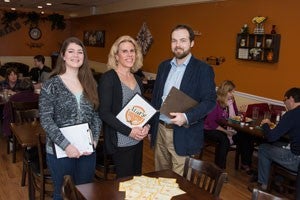Pay what you want pricing that adds up
Paying what you want for a meal is not usually a choice on a menu, but it is an option that’s been used in some urban area restaurants in recent years. So does it work? Can a business and patron both be satisfied?
URI Assistant Professor of Marketing Stephen Atlas sought to explore those questions and the viability of elective pricing options in a live experiment at a local restaurant, Mia’s Kitchen in Kingston.
“When able to choose their own price, customers often elect to pay less than the menu price. Although this may generate valuable news coverage, good will and positive customer feedback, it’s typically not a sustainable business practice,” said Atlas, whose research specialty is consumer purchasing behavior.
Not ready to close the book on the use of alternative payment strategies, Atlas considered the ‘Pay What You Want system with a twist.
“I wondered if a simple change might make this marketing strategy more sustainable. Instead of ‘Pay What You Want,’ what if retailers offered ‘Rebate What You Want’?” said Atlas. “This way a patron could decide not what they wanted to pay for a product, meal or service, but instead how much they wanted to get back from the vendor after paying the full price.”
To test this new approach to elective pricing, Atlas received a URI Faculty Career Enhancement Grant of $14,700 to test a simple, but novel approach that could make voluntary pricing arrangements more sustainable for retailers. He then forged a partnership with Mia Rao, the owner of Mia’s Kitchen, and involved an eager and talented undergraduate economics student, Vicky Ferraro, to help build and implement the study. This required implementing an experiment involving randomly assigning patrons to one of several payment frames, a difficult prospect in a busy restaurant setting.
When the team was ready, they put all the research cards on the table.
At the end of their meal, diners were given a card that contained their payment options, which differed from table to table. Some guests could choose to pay any portion of the menu price, while others could request a full or partial rebate instantly, and some had to pay full price but could mail in a rebate form to receive up to a full refund. The research grant funded the rebates and all related expenses to offset any financial costs for the restaurant and wait staff due to the experiment.
When the study ended in February, the results indicate that the elective payment method affected how much diners chose to pay for their meal. After accounting for discounts, diners paid the most if they needed to mail in a rebate to pay less than full price. They paid less if they picked their own price directly, and they paid the least when they picked their own instant rebate.
“The most surprising outcome was how much diners paid across conditions despite being told when they received their bill that they could have received a free meal,” Atlas said. “After accounting for tips, diners in all of the pay-what-you-want conditions paid more than the asking price, on average.”
According to Atlas, of nearly 150 diners who could have walked away with a free meal, nobody paid $0, and only four diners, 3 percent, paid less than half of the asking price. This outcome differed dramatically from what has been found in other pay-what-you-want settings.

“This project fostered a new working relationship with a local business, an experiential learning environment for Vicky, and significant pricing strategy insights,” said Atlas. “This is the kind of study a research school can do in a small community, and the URI grant is what made it all possible.”
College of Business Dean Maling Ebrahimpour said: “This unique project by Professor Atlas truly embodies the type of active learning and outreach that benefits students, engages the local business community and helps to expand the knowledge in the marketing field. It was an entrepreneurial and novel approach both to the important consumer purchasing behavior question and to the unique on-site research process itself,” he said.
“I was delighted to participate in this study,” said Mia Rao, who owns Mia’s Kitchen at the Kingston Emporium, 99 Fortin Road in Kingston. “This is one of the reasons I chose to open my restaurant, or my Kitchen, right here — to be an active member of this great university and the larger community” she said.
The Providence Journal also took a bite out of this URI business research news!
 Home
Home Browse
Browse Close
Close Events
Events Maps
Maps Email
Email Brightspace
Brightspace eCampus
eCampus


